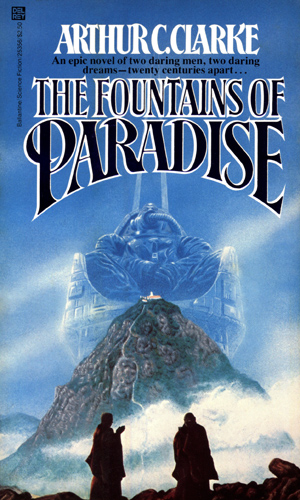I really need to read more Arthur
C. Clarke. Of the “Big Three” of science fiction (Isaac Asimov, Robert
Heinlein, and Arthur C. Clarke), Clarke is becoming my favorite. He is a more
talented writer than Asimov and does not get bogged down in political or
philosophical musings to the same extent as Heinlein. This factors that made Rendezvous with Rama one of my favorite
Hugos from the 1970 are on display in 1980’s winner, The Fountains of Paradise.
The
premise of Fountains is not nearly as
enticing as Rendezvous with Rama,
however. When I read the description on the back of the book I was not
encouraged. The plot, boiled down its core, is how an engineer creates the
first space elevator. That’s it. No exploration and no sense of discovery. A space elevator is giant structure that links the planet’s
surface to a satellite so people and objects can be moved easily and cheaply up
into space. An interesting and practical idea to be sure but not something on
which to base a whole book.
Yet Clarke makes it work. He keeps
the premise firmly grounded in hard sci-fi but gives it an interesting human
elements as well. The book delves into an interesting parallel story about King
Kashyapa I of Sri Lanka and his construction of the city of Sigiriya and a
place on top of a giant rock. The
place looks so interesting that I want to visit it myself. The major
conflict of the first half of the story is convincing a group of Buddhist monks
to give up their monastery so that the base for the elevator can be built
there. Like Rendezvous with Rama, the
conflict feels minor and not the real point of the goal of the narrative. The
only tension in the book occurs in the last section when the protagonist, Dr
Vannevar Morgan, takes a one-man vehicle up the elevator to save a group of
trapped researchers. Clarke sticks to the hard sci-fi approach here as Morgan
has to balance his oxygen use and momentum to make it to the group in time. It
is a gripping segment that surprised me a bit since the rest of the book is so
sedate.
The
Fountains of Paradise is a great book but I would still place it behind Rendezvous with Rama on my list of
Clarke’s works. Fountains lacks the
sense of wonder that Rendezvous had. Partially, this is the result of the
premise. The building of a space elevator is just not as interesting as
exploring a mysterious alien space craft, at least to me. There is more tension
but I missed the sense of discovery.
I should mention that this book
also contains first contact with alien intelligence as a minor plot point. Before the beginning of the
novel, an unmanned alien vessel, Starglider, swings through the Solar System
and makes contact with humans. Starglider is a powerful artificial intelligence
that uses scientific logic to refute all religions which subsequently vanish
almost immediately, with the exception of Buddhism. I found this part both odd
and a ridiculous. Odd in that it had very little to do with the rest of the
story and ridiculous because it is absurd to think that religion would just
vanish because an alien computer said that religion does not hold up to scientific
logic. Clarke is clearly trying to make a humanist point about a more utopian
post-religion world (he could have said nothing and the rest of the story
would be unchanged) but it falls flat. Many secular humanists think that people
cling to religion because they don’t understand the world and if they just
understood science then they would cease to believe. Yet, like much of the
human experience, reality is bit more complicated than that. Personally, I do not believe
that science and religion are like oil and water. Stephen Hawking wrote (I am paragraphing)
that science does not disprove the existence (nor non-existence) of God but
does show the rules He used to create the universe. Believing in the one does not negate the other. The Fountains of Paradise also end with aliens. In the far future,
humans have stopped living on Earth and instead moved to orbiting space stations
that encircle the planet. It was interesting ending but felt far removed the
rest of the book.
The 1980s are off to a good start.
I thoroughly enjoyed The Fountains of
Paradise and I feel any sci-fi fan would as well. Clarke deserves his place
as one of the greats of the genre. Hopefully 1981’s winner, The Snow Queen, will be just as good.

No comments:
Post a Comment